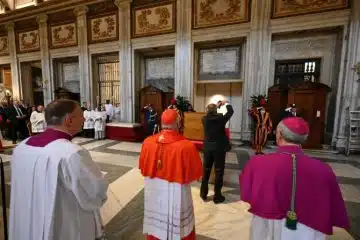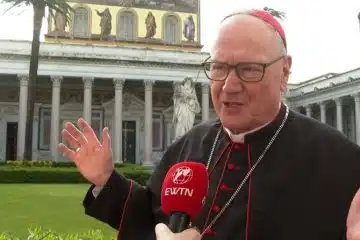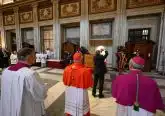Pope Francis admits women to ministries of lector and acolyte in new motu proprio
by Courtney Mares
Vatican City, Jan 11, 2021 / 04:05 am MT (CNA).- Pope Francis issued a motu proprio Monday changing canon law to allow women to serve as lectors and acolytes.
In the motu proprio “Spiritus Domini,” issued on Jan. 11, the pope changed canon 230 § 1 of the Code of Canon Law to read: “Lay persons of suitable age and with the gifts determined by decree of the Episcopal Conference may be permanently assigned, by means of the established liturgical rite, to the ministries of lectors and acolytes; however, the conferment of such a role does not entitle them to support or remuneration from the Church.”
Prior to this change, the law formerly said that “lay men who possess the age and qualifications established by decree of the conference of bishops can be admitted on a stable basis through the prescribed liturgical rite to the ministries of lector and acolyte.”
The roles of lector and acolyte are publicly recognized ministries instituted by the Church. The roles were once considered “minor orders” in the tradition of the Church and were changed to ministries by Pope Paul VI. According to Church law, “before anyone is promoted to the permanent or transitional diaconate, he is required to have received the ministries of lector and acolyte.”
Pope Francis wrote a letter to Cardinal Luis Ladaria, prefect of the Congregation for the Doctrine of the Faith, explaining his decision to admit women to the ministries of lector and acolyte.
In this letter, the pope highlighted the distinction between “‘established’ (or ‘lay’) ministries and ‘ordained’ ministries,” and expressed hope that opening these lay ministries to women might “better manifest the common baptismal dignity of the members of the People of God.”
He said: “The Apostle Paul distinguishes between gifts of grace-charisms (‘charismata’) and services (‘diakoniai’ – ‘ministry [cf. Rom 12, 4ff and 1 Cor 12, 12ff]). According to the tradition of the Church, the various forms that charisms take when they are publicly recognized and are made available to the community and its mission in a stable form are called ministries,” the pope wrote in the letter published Jan. 11.
“In some cases the ministry has its origin in a specific sacrament, Holy Orders: these are the ‘ordained’ ministries, the bishop, the presbyter, the deacon. In other cases the ministry is entrusted, with a liturgical act of the bishop, to a person who has received Baptism and Confirmation and in whom specific charisms are recognized, after an adequate journey of preparation: we then speak of ‘instituted’ ministries.”
The pope noted that there is “an ever greater urgency today to rediscover the co-responsibility of all the baptized in the Church, and especially the mission of the laity.”
He said that the 2019 Synod of Bishops for the Pan-Amazonian region “signaled the need to think about ‘new paths for ecclesial ministeriality,’ not only for the Amazonian Church, but for the whole Church, in the variety of situations.”
“It is urgent that they be promoted and confer ministries on men and women … It is the Church of baptized men and women that we must consolidate by promoting ministry and, above all, awareness of baptismal dignity,” Pope Francis said, quoting the synod’s final document.
Pope Paul VI abolished the minor orders (and the subdiaconate) and established the ministries of lector and acolyte in the motu proprio, “Ministeria quaedam,” issued in 1972.
“The Acolyte is established to help the Deacon and to minister to the Priest. It is therefore his duty to take care of the service of the altar, to help the Deacon and the Priest in liturgical actions, especially in the celebration of the Holy Mass,” Paul VI wrote.
Potential responsibilities for an acolyte include distributing Holy Communion as extraordinary minister if such ministers are not present, publicly exposing the Sacrament of the Eucharist for adoration by the faithful in extraordinary circumstances, and “the instruction of the other faithful, who, on a temporary basis, help the deacon and the priest in liturgical services by carrying the missal, cross, candles, etc.”
“The Acolyte, destined in a special way to the service of the altar, learns all those notions concerning divine public worship and strives to understand its intimate and spiritual meaning: in this way he can offer himself, every day, completely to God and be, in the temple, an example to all for his serious and respectful behavior, and also to have a sincere love for the mystical body of Christ, or people of God, and especially for the weak and the sick,” “Ministeria quaedam” says.
In this decree, Paul VI wrote that the lector is “instituted for the office, proper to him, of reading the word of God in the liturgical assembly.”
“The Reader, feeling the responsibility of the office received, should do all he can and make use of the appropriate means to acquire every day more fully the sweet and lively love and the knowledge of Sacred Scripture, in order to become a more perfect disciple of the Lord,” it says.
Pope Francis said in his letter that it would be up to local bishops’ conferences to establish appropriate criteria for the discernment and preparation of candidates for the ministries of lector and acolyte in their territories.
“Offering lay people of both sexes the possibility of accessing the ministry of the Acolyte and the Lector, by virtue of their participation in the baptismal priesthood, will increase the recognition, also through a liturgical act (institution), of the precious contribution that many lay people, even women, offer to the life and mission of the Church,” Pope Francis said.













